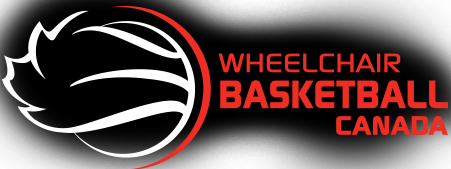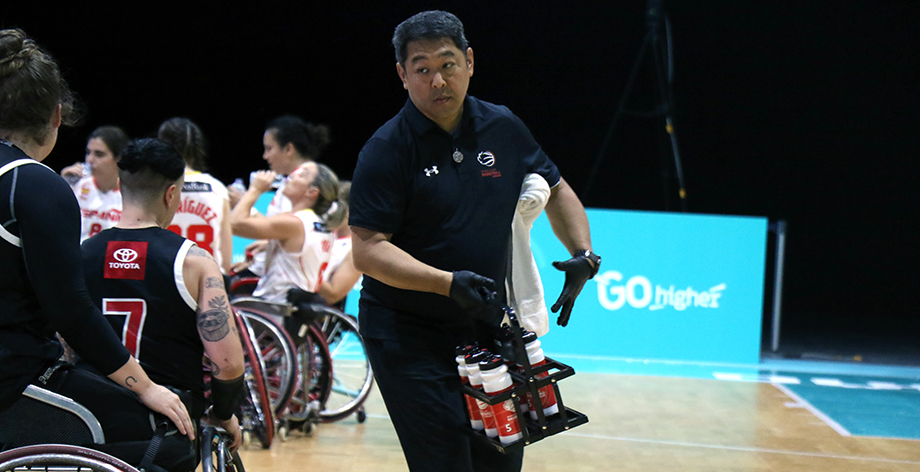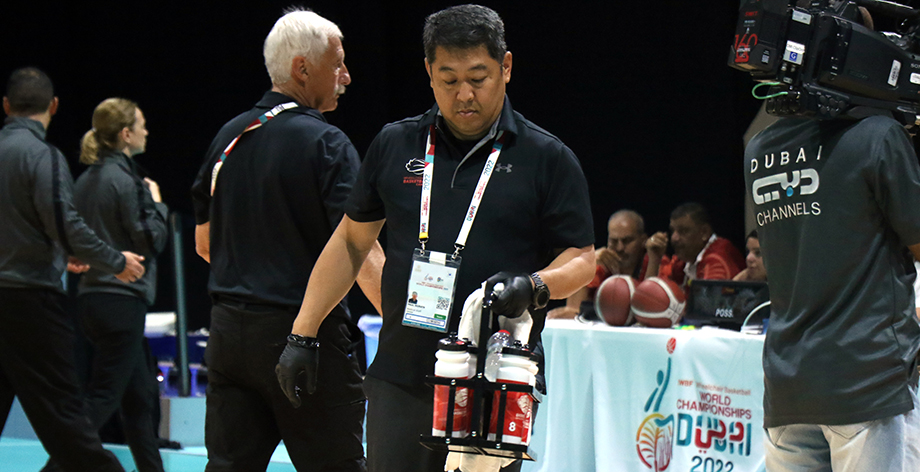The Toronto native is the Athletic Therapist for the Senior Women’s National Team
Paul Murata played hockey, football, and ran track growing up in Toronto. After graduating from Northern Secondary School, where he was the first freshman to crack the varsity hockey team, Murata figured he was done playing sports until a friend convinced him to pursue a football scholarship at Oklahoma Panhandle State.
“I was just about to attend Central Michigan University and accept a partial academic scholarship there,” Murata recalled. “I took a trip after high school to Southeast Asia for six weeks and travelled by myself. When I came home, I had two weeks to move, and I had a message on my answering machine. It was a buddy down at Oklahoma Panhandle State saying, ‘Oh, you got to come down here. Give me a call’.”
After just one season playing cornerback for the Aggies, Murata realized he was done with sports.
“I was a lot lighter and faster back then I was maybe 150 pounds at the most,” Murata said, “but you’re playing against these 250–300-pound guys and they could run like the wind. I realized quickly that I was done.”
Murata was done with football, but not with sports entirely.
He enrolled in the Athletic Training program at Temple University in Philadelphia and quickly found his calling.
“I was always interested in the sports sciences and into sports,” said Murata. “I loved it from the get-go. It was great. I worked with great athletes, athletic trainers, sports medicine professionals and doctors.”
After graduating with his Bachelor of Science Degree in Athletic Training, Murata took a job at Lower Merion High School as its Head Athletic Trainer, but his time away from Temple was short-lived. Following a stint as Head Athletic Trainer with Lincoln University, Murata was back at Temple as an Athletic Trainer just four years after graduating.
“Temple opened a full-time position for me. I was always football, I always wanted to work in football. I thought football was the greatest,” said Murata. “There was a position with women’s basketball that needed to be filled part-time. I worked with them for half a season and was asked to stay on full time with them, and the rest is history.”
Murata would work with hall of famer Dawn Staley at both Temple and then later at the University of South Carolina.
The 52-year-old also squeezed in a four-year stint at the University of Virginia as an Athletic Trainer.
“Then Dawn Staley called again and asked me if I could come down to South Carolina; they had a position open there,” Murata said. “I loved the University of Virginia; it was the best. I still think it’s the gold standard of sports medicine, but it was family calling.”
Murata spent three years as an Athletic Trainer with the women’s basketball team in Columbia, South Carolina, before it was time to move home.
In 2015, Murata returned to Toronto after meeting his now wife, MiRyung.
To work in Canada, Murata went to the College of Kinesiologists of Ontario and registered as a kinesiologist. Murata volunteered as a healthcare provider at the Toronto Athletic Club until his father died.
“They had equipment at the Toronto Athletic Club that I was familiar with, so I could do a lot of stuff,” he said. “I stopped working there when my father died. At that time, I fell into a little bit of depression, and that’s when Wheelchair Basketball Canada came around, and I started working with WBC. That kind of helped me pull me out of it a little bit.”
After more than 20 years working in sports sciences on both sides of the border, Murata couldn’t see himself doing anything else.
“You’re hands-on, and it’s not completely academic, but it’s not clinical, where you’re sitting inside somewhere all day, you’re out in the field with the athletes,” he explained. “It’s long days. The athletes are on the field for a set number of hours but you have to be ready a couple of hours before and after. You’re on call as well, just in case a problem occurs during off hours.
“It’s long hours, but it’s something that most in our field when they get into it, can’t see anything else. They can’t see themselves doing anything else.”




